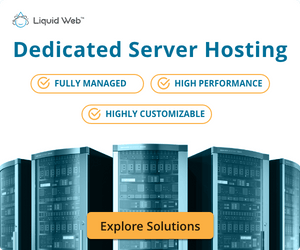VPS vs Dedicated vs Cloud Hosting: How to Choose
What’s most important to you when selecting your web hosting? To some, it’s pricing. But there’s more to choosing the right hosting product than that.
Basing your decision entirely on price may hurt your business in the long run. When comparing prices on VPS vs dedicated servers vs cloud hosting, it may seem like they’re all the same – making the least expensive option seem likea no-brainer, right? In reality, just because a hosting option is cheap doesn’t mean it’s the best solution for you.
Not sure what kind of server hosting solution you need for your business? Check out the core differences between hosting types to help you make the right decision.
Here’s a look ahead at the contents of this comprehensive guide to hosting:
Before deciding what hosting type to choose, let’s first review the definitions of VPS vs dedicated vs cloud server hosting.
What is VPS Hosting?
Virtual Private Server (VPS) Hosting is a cross between shared and dedicated hosting. A physical server (also called the parent) runs several VPS instances, which are granted a strict portion of the parent server’s hardware resources. These instances are rented out and operate as independent server environments. So, it’s essentially renting part of a dedicated server. These plans vary in price and offer affordable scaling, better performance, and better security than shared hosting.
How VPS Hosting Works
Virtualization technology enables one server – the parent server – to be partitioned into several different virtual instances. Each of these instances acts as its own independent, private server environment. Businesses that use VPS hosting can experience the same resource-rich environment of a dedicated server at a much more accessible price point.
While there are noticeable differences running VPS vs dedicated vs cloud servers, no one environment is better than the other. Your unique business needs will determine the right hosting environment for you and your team.
VPS Hosting Pros and Cons
When we shift gears to understand the benefits of VPS hosting, we see that performance matters. To keep your clients happy, you need to provide them with top-notch performance.
According to WebFX, 83% of users expect a website to load in no more than three seconds. Furthermore, a second-page speed report by Unbounce found that 70% of shoppers said page speed affects their decision to buy from a brand.
The bottom line is that when it comes to page speed, one second can make all the difference. By shaving just a single second off your page load times, you can increase your site’s conversion rate by multiple percentage points.
This in-depth breakdown of the pros and cons of VPS vs dedicated servers will help you understand everything you need to decide if VPS is the right hosting environment.
Pros of VPS Hosting
High Scalability
VPS systems are extremely flexible when it comes to scaling. They have greater capability in terms of adding and removing resources, including CPU cores, system memory, and additional disks or disk space. They are only limited by the available hardware on the parent server. However, they are generally portable between like parents. As such, they can be easily moved and upgraded through your hosting provider with minimal downtime and turn-around time for upward scaling.
High Security
Each user occupies their own space, isolated from their neighbors with independent IP addresses. In rare instances, a virus may bypass the hypervisor – the server layer allowing for partitioning and isolation – which could leave all sites on the VPS server vulnerable. VPS and dedicated hosting solutions provide high security, but if you’re examining the security level of VPS vs dedicated servers, dedicated servers still take the top spot.
Some Configurability
There are very few restrictions with VPS hosting. Each environment is separate from the others on the server and acts exactly like a dedicated server with a few off-limit configurations. Direct access to the hardware is the most significant restriction. This prevents running hardware emulation within the VPS and accessing non-network attached storage devices.
In terms of controllability with installing specific software and custom configurations, a VPS server gives you complete access to your system to enable, disable, install, or remove any software you wish and adjust configurations to your specifications. Additionally, with VPS hosting, you aren’t restricted to the software your provider places in your environment. You can install any application on your VPS, including WordPress.
Mid-Tier Performance
Depending on your needs, this could be a pro or con. VPS (vs dedicated) instances are limited by the available hardware assigned to the plan. There is a performance tax on the hardware when running in a virtualized setup. However, this tax has become smaller over time and provides performance levels that are more comparable to dedicated servers.
Cons of VPS Hosting
Mid-Level Cost
Variable cost is another factor that could be a pro, but it will still be more expensive than the low cost of basic shared hosting solutions. VPS solutions come in many forms, from the smallest 2GB server to massive 128-core machines. VPS parent servers are often built from the very best hardware available and offer the most varied configurations for users. When it comes to VPS vs dedicated servers, both will be at a higher price point than shared hosting, with VPS being the more budget-friendly option.

What is Dedicated Hosting?
Much of the focus today is on cloud technology, but traditional models aren’t going anywhere. So, what is fully managed dedicated hosting?
Dedicated servers are precisely what the name implies – a single server dedicated to you. All the hardware that makes up the server is under your control. Also known as bare metal servers, these machines often share network access with neighboring dedicated servers in a data center but no hardware. These hosting plans tend to be more expensive than shared or VPS but can give you better performance, security, and flexibility. This is especially true if you require any custom configurations or specific hardware.
How Dedicated Hosting Works
Dedicated hosting involves one physical server dedicated to a particular business. The company uses that server’s hardware and software resources in isolation and doesn’t share with any other organization.
When looking at VPS vs dedicated servers, they work in similar ways. The main difference is that the isolated server instance created in VPS is virtual. Truly dedicated server environments rely on physical legacy IT assets to give business owners increased control, performance, and security.
Dedicated Hosting Pros and Cons
Dedicated servers can do virtually anything when it comes to hosting solutions. They are the backbone of all Internet-hosted sites or applications. All software must run on physical hardware in some form or another, so there really is no limit to what can be done with dedicated servers.
Pros of Dedicated Hosting
Highest Security
Because you are the only one using the dedicated server, the risk of attack is minimal. Your connection, along with your hardware, is completely private and contained. Another important consideration is that dedicated hosting can take advantage of more advanced security measures, such as a traditional hardware firewall, while cloud and VPS hosting solutions cannot. This is a prime example of why there is more to selecting the right hosting product than just pricing.
High Performance
Dedicated servers allow direct access to the hardware and provide amazing performance for custom configurations and increased control.
Highest Configurability
You can configure dedicated servers can any way you choose with no limitations or restrictions from the host because the user has direct access. Similar to how VPS hosting offers greater control with installing specific software and settings configurations, the same can be said for dedicated servers and cloud servers. However, keep in mind that although VPS and dedicated servers offer greater configurability, cloud hosting only offers surface-level customization and controls.
Cons of Dedicated Hosting
Mid-Level Scalability
Dedicated servers have great performance but are limited by the physical hardware and space in their chassis. Upgrades are always possible but may require significant downtime or migrations, depending on the scale of the necessary upgrade. Server clustering and high availability solutions can limit this but generally have a much higher price point. The difference can be marginal, but when comparing dedicated servers vs VPS, VPS hosting comes out on top when it comes to scalability.
High Cost
Generally, dedicated servers will cost more in both monthly recurring fees and hardware upgrades, mainly because you’re paying for the hardware and not piggybacking off of larger hardware, like in the case of VPS configurations. Costs will also vary based on your decision between managed vs unmanaged dedicated servers.

What is Cloud Server Hosting?
Cloud server hosting relies on a pool of common resources to serve various organizations via an internet connection. Many business owners find cloud environments attractive for their flexibility.
Because the Internet supports your entire hosting environment, cloud environments allow organizations to accomplish their tasks anywhere, anytime. But relying solely on Internet connectivity to run your network infrastructure is not without its drawbacks.
Cloud Server Hosting Pros and Cons
Pros of Cloud Hosting
High Scalability
By their nature, cloud servers can scale up and down very quickly to meet traffic and resource demands. Since cloud technology relies solely on an Internet connection and exists in a virtual environment, there’s almost no limit to its adaptation of resources. This access to near-limitless bandwidth and resources positions cloud servers as the most scalable type of hosting available.
High Performance
Cloud servers also grant amazing performance, especially for sites and applications prone to uneven traffic or that require resources to increase quickly. Your resource capabilities are only limited by the package you purchase from your provider. And since all software, resources, and configurations exist on the Internet, upscaling your server capacity happens almost instantaneously.
High Security
Cloud servers are proactively monitored for security threats. Since they are redundant and exist across a network of multiple nodes (server PCs) – glued together by virtualization – you can be sure your site stays online in case something does happen.
Some Configurability
Like VPS and dedicated hosting solutions, cloud servers also grant complete access to the systems and are a highly scalable cPanel solution, so the sky’s the limit for configuration. Unlike dedicated servers that give full control, cloud servers have no root access for customers and are used exclusively with Linux and cPanel.
While this is the case for typical cloud servers, our team at Liquid Web does things differently. Customers have full root control of virtual machine instances with VPS hosting from Liquid Web. The only area you wouldn’t be able to control or configure is the overall VM environment.
Cons of Cloud Hosting
High Cost
Cloud servers are relatively similar in cost to dedicated servers. This difference in pricing is because cloud servers provide access to a cluster of highly available servers. Scaling is only limited by the unused resources available at the time across the connected nodes.
VPS vs Dedicated vs Cloud: How Do You Choose?
When deciding between cloud vs VPS vs dedicated hosting, make sure you select a hosting provider that will not only meet your needs today but also be able to accommodate your growth. While it is easy to see that cloud hosting is a cheaper solution, it can get much more expensive for web agencies in the long run.
The hosting solutions laid out in this resource all have their respective benefits and drawbacks to consider when deciding which will work best for you. Your unique needs usually dictate what features and functionality matter most.
Here’s a recap of each hosting environment’s best use cases based on the pros and cons of each:
- VPS Hosting — With lower costs than dedicated or cloud hosting, VPS is a middle-of-the-road offering with affordable scaling and better performance and security than cloud hosting. VPS hosting is an excellent choice for production and development environments, as it can house most websites and applications while still providing great performance.
- Dedicated Hosting — A suitable option with better performance and security than cloud and VPS hosting, dedicated hosting also has more unrestricted configurability than cloud servers. However, cloud hosting has more in the way of scalability. Dedicated servers are premier hosting solutions and can handle the needs of almost any website or product, especially those involving specific configurations or legacy applications.
- Cloud Hosting — Although the highest cost compared to shared, VPS, and dedicated, cloud hosting is a premium, top-of-the-line solution. Cloud hosting is best for those that need a quickly deployable, scalable, and stable solution.
Comparing Cloud vs VPS vs Dedicated Servers
When looking at VPS vs dedicated servers, it can be easy to confuse the two. They behave similarly in that they both provide an isolated set of resources for only one business. This gives you a level of control and customization that you can’t find in other hosting environments.
Where they differ is when it comes to security. Dedicated servers provide greater security because one particular organization has access to an entire physical server environment. On the other hand, with VPS, the physical server acts as a parent, and multiple clients are granted access through virtualization.
This partitioning creates several server instances within the parent server. While these allow isolated access to a certain amount of resources for each user, they are only protected by the server’s hypervisor layering – making them much less secure than being the sole user of an entire physical dedicated server environment.
Cloud servers are slightly different. Organizations can create as many virtual instances as they wish on a cloud server, but these environments aren’t truly isolated. Each virtual machine within a cloud server works as part of a whole.
Since all these virtual instances work together, a website hosted on a cloud environment can draw power from multiple servers at the same time - ensuring the site is flexible, scalable, and can handle large spikes in traffic as they occur. Downtime is also minimal because as one server goes down, another virtual instance can take its place.
Choosing the Best Option for You
As you choose your preferred hosting, remember the adage: You get what you pay for. You need to consider more than just price.
What’s most important to you, control, scalability, flexibility, cost, or security? Your choice will ultimately boil down to what your business needs most to thrive. Brainstorm to decide what would bring your business furthest along. Remember that you want a hosting environment that will support your business now but also allow you to grow into the thriving business you know you will become.
If security is your biggest concern, go with a dedicated environment. If cost and scalability are important to you, a VPS or cloud hosting environment may be your best choice.
Of course, it never hurts to enlist the help of a hosting expert to guide you on your way. Liquid Web’s team of The Most Helpful Humans in Hosting® is available 24/7/365 to do just that.
Alternative Options
What is Shared Hosting?
Shared hosting is very similar to cloud hosting. Both environments involve multiple users sharing pooled resources on one physical server environment. While both environments are the least secure, they still provide enough security for users to feel safe using them. They also have the lowest barrier of entry as far as cost and learning curve is concerned. If you’re a small business owner just starting in the world of hosting, shared hosting might be a good jumping-off point.
Get Started with Your Ideal Hosting from Liquid Web
The choice of VPS vs dedicated vs cloud servers for your business shouldn’t be taken lightly. You’re essentially choosing the backbone of your online presence for a long time to come. It’s critical that you focus on more than just price and thoughtfully weigh the pros and cons of each server environment discussed here today.
You owe it to yourself to browse Liquid Web’s dedicated, VPS, and cloud hosting products before deciding. We’ll leverage our decades of experience to show you what will work best for you. You’ll also be working with hosting products backed by the best customer service in the industry and a team of experts available whenever you need us.
Discover what the power of Liquid Web's VMware hosting, VPS, dedicated, or private cloud hosting backed by Liquid Web can do for you.
Related Resources

Jason Potter
A veteran of the IT Support field, I have more than a decade of experience in systems administration, web hosting, and cPanel servers. I enjoy writing and providing complicated technical concepts in layman terms. On my free time, I enjoy playing several types video games, automation scripting and just living life with my wife and two kids.
Keep up to date with the latest Hosting news.



